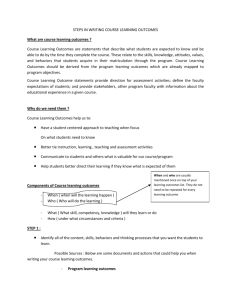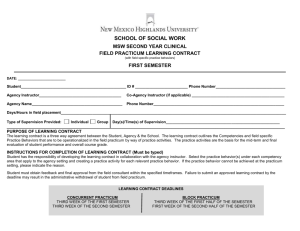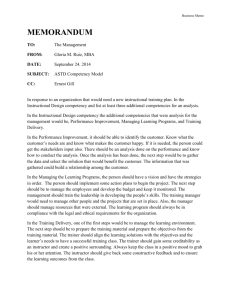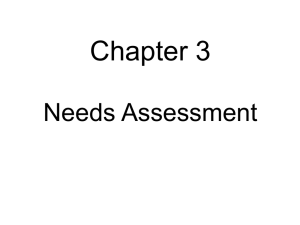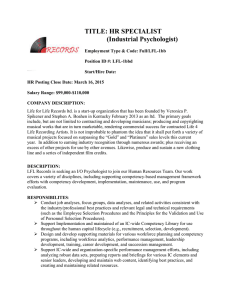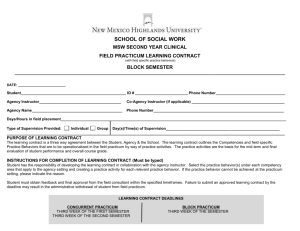LEARNING PLAN BSW LEARNING PLAN I :
advertisement
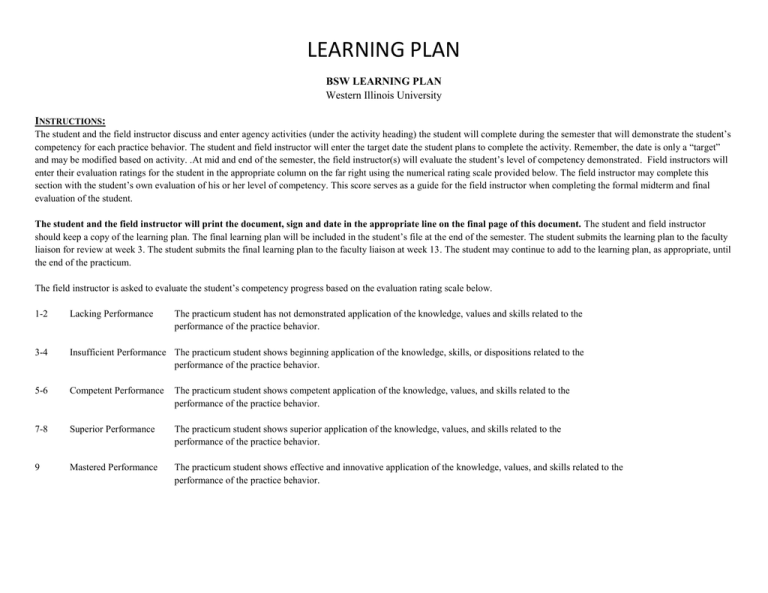
LEARNING PLAN BSW LEARNING PLAN Western Illinois University INSTRUCTIONS: The student and the field instructor discuss and enter agency activities (under the activity heading) the student will complete during the semester that will demonstrate the student’s competency for each practice behavior. The student and field instructor will enter the target date the student plans to complete the activity. Remember, the date is only a “target” and may be modified based on activity. .At mid and end of the semester, the field instructor(s) will evaluate the student’s level of competency demonstrated. Field instructors will enter their evaluation ratings for the student in the appropriate column on the far right using the numerical rating scale provided below. The field instructor may complete this section with the student’s own evaluation of his or her level of competency. This score serves as a guide for the field instructor when completing the formal midterm and final evaluation of the student. The student and the field instructor will print the document, sign and date in the appropriate line on the final page of this document. The student and field instructor should keep a copy of the learning plan. The final learning plan will be included in the student’s file at the end of the semester. The student submits the learning plan to the faculty liaison for review at week 3. The student submits the final learning plan to the faculty liaison at week 13. The student may continue to add to the learning plan, as appropriate, until the end of the practicum. The field instructor is asked to evaluate the student’s competency progress based on the evaluation rating scale below. 1-2 Lacking Performance The practicum student has not demonstrated application of the knowledge, values and skills related to the performance of the practice behavior. 3-4 Insufficient Performance The practicum student shows beginning application of the knowledge, skills, or dispositions related to the performance of the practice behavior. 5-6 Competent Performance The practicum student shows competent application of the knowledge, values, and skills related to the performance of the practice behavior. 7-8 Superior Performance The practicum student shows superior application of the knowledge, values, and skills related to the performance of the practice behavior. 9 Mastered Performance The practicum student shows effective and innovative application of the knowledge, values, and skills related to the performance of the practice behavior. LEARNING PLAN Competency # 1: Identify as a professional social worker and conduct oneself accordingly. Practice Behaviors Activities Target Date Midterm Evaluation Final Evaluation Target Date Midterm Evaluation Final Evaluation Advocate for client access to the services of social work Practice personal reflection and selfcorrection. Attend to professional roles and boundaries Demonstrate professional demeanor in behavior, appearance, and communication. Engage in career-long learning Use supervision and consultation. Competency # 2: Apply social work ethical principles to guide professional practice. Practice Behaviors Recognize and manage personal value in a way that allows professional values to guide practice. Make ethical decisions by applying NASW or International ASW Code of Ethics using ethical reasoning to arrive at principled decisions. Tolerate ambiguity in resolving ethical conflicts. Activities LEARNING PLAN Apply strategies of ethical reasoning to arrive at principled decisions Competency #3: Apply critical thinking to inform and communicate professional judgments. Practice Behaviors Activities Target Date Midterm Evaluation Final Evaluation Target Date Midterm Evaluation Final Evaluation Distinguish, appraise, and integrate multiple sources of knowledge, including research-based knowledge and practice wisdom. Analyze models of assessment, prevention, intervention, and evaluation. Demonstrate effective oral and written communication in working with individuals, families, groups, organization, communities, and colleagues. Competency # 4: Engage diversity and difference in practice. Practice Behaviors Recognize the extent to which a culture’s structures and values may oppress, marginalize, alienate, or create /enhance privilege and power. Gain sufficient self-awareness to eliminate the influence of personal biases and values in working with diverse groups Recognize and communicate understanding of the importance of difference in shaping life experiences. View themselves as learners and engage those with whom they work as informants Activities LEARNING PLAN Competency # 5: Advance human rights and social and economic justice. Practice Behaviors Activities Target Date Midterm Evaluation Final Evaluation Target Date Midterm Evaluation Final Evaluation Target Date Midterm Evaluation Final Evaluation Understand the forms and mechanisms of oppression and discrimination Advocate for human rights and social and economic justice. Engage in practices that advance social and economic justice. Competency # 6: Engage in research-informed practice and practice-informed research. Practice Behaviors Activities Use practice experience to inform scientific inquiry. Use research evidence to inform practice. Competency # 7: Apply knowledge of human behavior and the social environment. Practice Behaviors Utilize conceptual frameworks to guide the processes of assessment, intervention, and evaluation Critique and apply knowledge to understand person and environment Activities LEARNING PLAN Competency # 8: Engage in policy practice to advance social and economic well-being and to deliver effective social work services. Practice Behaviors Activities Target Date Midterm Evaluation Final Evaluation Target Date Midterm Evaluation Final Evaluation Target Date Midterm Evaluation Final Evaluation Analyze, formulate, and advocate for policies that advance social wellbeing. Collaborate with colleagues and clients for effective policy action. Competency # 9: Respond to contexts that shape practice. Practice Behaviors Activities Continuously discover, appraise and attend to changing locales, populations, scientific and technological developments, and emerging societal trends to provide relevant services. Provide leadership in promoting sustainable changes in service to improve the quality of services. Competency # 10: Engage, assess, intervene, and evaluate with individuals, families, groups, organizations, and communities. Practice Behaviors Activities Substantively and effectively prepare for interaction with clients. Use empathy and interpersonal skills to engage clients Develop a mutually agreed upon focus of work, goals, objectives and desires outcomes. Collect, organize, and interpret client data LEARNING PLAN Assess client strengths and limitations Use appropriate intervention strategies Initiate actions to achieve organizational goals Implement prevention interventions that enhance client capacities. Help clients to achieve goals and/or resolve problems through negotiation, mediation, advocacy and the facilitation of transitions and endings. Student Signature________________________________________________ Field Instructor Signature__________________________________________ Date___________________________________________
